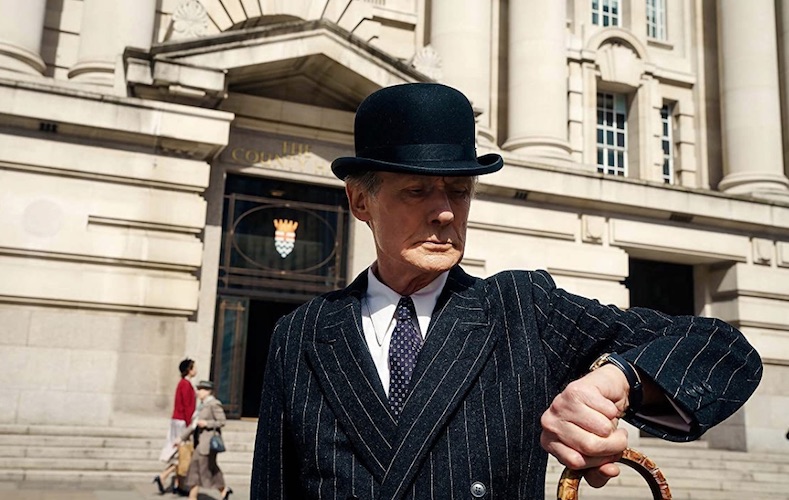
The final chapter of a British gentleman’s life, numbed by decades of routine drudgery, blossoms with newfound purpose in the Oscar-nominated film, Living. Bill Nighy delivers a towering portrayal of understated pathos as Mr. Williams, the top bureaucrat at a public works office in 1953’s downtown London. As a widower, Mr. Williams lives with his son and daughter-in-law. They have no interest in him beyond his life savings they hope to inherit. At work, he’s part of a small army of feckless paper-pushers. A malfunctioning air raid siren reminds them of how little removed they are from the German blitz, but its banshee wail also serves as a portentous omen; Mr. Williams is about to find out he’s terminally ill with only six months left to live.
His initial impulse is to flee to the coast where he overhears a writer in a seaside café complaining about insomnia. Mr. Williams offers him four jars of sleeping pills. The writer, played by Tom Burke with a screen presence that recalls Orson Welles, greets the gesture with raised eyebrows. Mr. Williams explains his situation and admits he had planned on killing himself, but now wants to do something he hasn’t ever done before – he wants to “live a little.” The writer proposes his concept of living: boozing it up and enjoying the nightlife. Their carousing leads to a lovely moment when Mr. Williams silences an entire pub by softly singing a Scottish lament. Clearly, though, his heart yearns for something more meaningful.
Returning to London, Mr. Williams is spotted by Miss Harris, an underling at his office charmingly portrayed by Aimee Lou Wood. She approaches him for a job reference. He suggests lunch. At the restaurant, Miss Harris impishly shares the nickname she secretly invented for him; “Mr. Zombie,” because he appears “dead, like an Egyptian mummy, but still milling about.” Unoffended, Mr. Williams becomes infatuated with the irrepressible young woman and hopes her vivacious spirit will somehow rub off on him. A short time later, he has an epiphany; he must accomplish something of consequence with what little time he has. In a flash of inspiration, he does just that, resulting in a heart-rending posthumous reappraisal of the man everyone thought they knew.
Living is a surprisingly affecting remake of the 1952 Japanese masterpiece, Ikiru, made by legendary filmmaker Akira Kurosawa. Working off a script written by Nobel Prize-winning author Kazuo Ishiguro, South African director Oliver Hermanus now stands alongside Sergio Leone and John Sturges in successfully adapting a Kurosawa classic for western audiences. Unlike Kurosawa’s deep focus that rendered everything in the frame crystal clear, Hermanus occasionally plays with depth of field to emphasize Mr. Williams’ detachment from life by placing him between blurred backgrounds and foregrounds. The score evokes the time and place of a bygone era with Big Band music conducted by Tommy Dorsey, Les Brown and Jackie Gleason, and the squarish 4:3 aspect ratio subtly contributes to the retro ambience. Two central metaphors – neglected stacks of paperwork and speeding trains – suggest the ruinous effects of inaction and the inexorable forward momentum of time. Artistic flourishes, excellent acting, and solid craftsmanship notwithstanding, Living is unlikely to displace Ikiru within the pantheon of essential viewing, but hopefully it will impart the same timeless lessons to a new generation.
For KSQD’s Film Gang, this is Paul Kanieski











